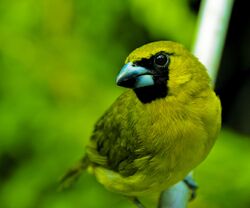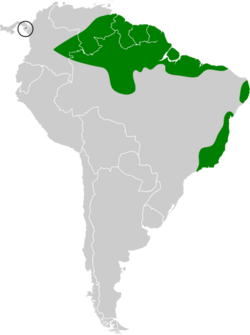Biology:Yellow-green grosbeak
| Yellow-green grosbeak | |
|---|---|

| |
| Scientific classification | |
| Domain: | Eukaryota |
| Kingdom: | Animalia |
| Phylum: | Chordata |
| Class: | Aves |
| Order: | Passeriformes |
| Family: | Cardinalidae |
| Genus: | Caryothraustes |
| Species: | C. canadensis
|
| Binomial name | |
| Caryothraustes canadensis (Linnaeus, 1766)
| |

| |
| Synonyms | |
|
Loxia canadensis Linnaeus, 1766 | |
The yellow-green grosbeak (Caryothraustes canadensis) is a species of grosbeak in the family Cardinalidae.
Taxonomy
In 1760 the French zoologist Mathurin Jacques Brisson included a description of the yellow-green grosbeak in his Ornithologie based on a specimen collected in Cayenne in French Guiana. He used the French name Le Gros-bec de Cayenne and the Latin name Coccothraustes Cayanensis.[2] Although Brisson coined Latin names, these do not conform to the binomial system and are not recognised by the International Commission on Zoological Nomenclature.[3] When in 1766 the Swedish naturalist Carl Linnaeus updated his Systema Naturae for the twelfth edition he added 240 species that had been previously described by Brisson.[3] One of these was the yellow-green grosbeak. Linnaeus included a terse description, used the binomial name Loxia canadensis and cited Brisson's work.[4] Linnaeus mistakenly claimed that the species occurred in Canada rather than Cayenne and introduced the specific name canadensis for Canada where the bird does not occur.[5] This species is now placed in the genus Caryothraustes that was introduced by the German naturalist Ludwig Reichenbach in 1850.[6] There are four subspecies.[7]
Distribution and habitat
It is found in Brazil , Colombia, French Guiana, Guyana, Panama, Suriname, and Venezuela. Its natural habitats are subtropical or tropical moist lowland forest and heavily degraded former forest.
References
- ↑ BirdLife International (2020). "Caryothraustes canadensis". IUCN Red List of Threatened Species 2020: e.T22723831A138395905. doi:10.2305/IUCN.UK.2020-3.RLTS.T22723831A138395905.en. https://www.iucnredlist.org/species/22723831/138395905. Retrieved 13 November 2021.
- ↑ Brisson, Mathurin Jacques (1760) (in fr, la). Ornithologie, ou, Méthode contenant la division des oiseaux en ordres, sections, genres, especes & leurs variétés. 3. Paris: Jean-Baptiste Bauche. pp. 229–230, Plate 11 fig 3. https://biodiversitylibrary.org/page/35953256. The two stars (**) at the start of the section indicates that Brisson based his description on the examination of a specimen.
- ↑ 3.0 3.1 Allen, J.A. (1910). "Collation of Brisson's genera of birds with those of Linnaeus". Bulletin of the American Museum of Natural History 28: 317–335.
- ↑ Linnaeus, Carl (1766) (in la). Systema naturae : per regna tria natura, secundum classes, ordines, genera, species, cum characteribus, differentiis, synonymis, locis. 1, Part 1 (12th ed.). Holmiae (Stockholm): Laurentii Salvii. p. 304. https://biodiversitylibrary.org/page/42946500.
- ↑ Jobling, J.A. (2018). "Key to Scientific Names in Ornithology". in del Hoyo, J.; Elliott, A.; Sargatal, J. et al.. Handbook of the Birds of the World Alive. Lynx Edicions. https://www.hbw.com/dictionary/definition/canadensis.
- ↑ Reichenbach, Ludwig (1850). Avium Systema Naturale. Das natürliche System der Vögel. Dresden: Expedition der Vollständigsten Naturgeschichte. Plate 78. https://biodiversitylibrary.org/page/47618521.
- ↑ Gill, Frank; Donsker, David, eds (2018). "Cardinals, grosbeaks and (tanager) allies". World Bird List Version 8.1. International Ornithologists' Union. http://www.worldbirdnames.org/bow/cardinals/.
Wikidata ☰ Q2226642 entry
 |


